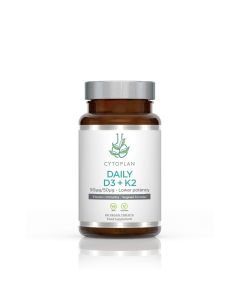How do I get vitamin C in my diet?
Vitamin C is naturally present in citrus fruits and other fruits and vegetables. Humans do not have the ability to make vitamin C and, as it is a water-soluble vitamin, the body is unable to store it. Because of this, it must be obtained and replenished regularly through the diet.
Eating a healthy balanced diet is always recommended although meeting the requirements for vitamin C can be challenging against the backdrop of a demanding lifestyle, stress and diets low in fruit and vegetables.
Vitamin C capsules and supplements can therefore provide additional support and safeguard against any nutritional shortfalls.
Benefits of vitamin C
Although vitamin C is best known for supporting immune system health, it has a wide range of functions within the body.
These include contributing to the normal functioning of the nervous system, energy metabolism, and to the reduction of tiredness and fatigue.
Vitamin C also contributes to normal collagen formation and increased iron absorption. Importantly, as an antioxidant, vitamin C contributes to the protection of our cells from oxidative stress.
Choose the best vitamin C capsules & supplements
Our range has vitamin C supplements to suit the whole family including an Organic Elderberry & Vitamin C whole plant extract tincture which is ideal for both adults and kids; vitamin C powder to allow for flexible dosing and for those who do not like swallowing capsules; a high strength vitamin C, and wholefood vitamin C made from acerola cherries.
We also offer Wholefood and Food State vitamin C
Through replicating nature, we strive to provide the best, most natural and most bioeffective vitamin C supplements to support your optimal health.
Within our range we also offer supplements in Wholefood and Food State forms; our Organic Vitamin C, Wholefood Cherry C capsules and Vitamin C (Food State) tablets are recognised by your body in the same way as vitamin C obtained from food. This is because as a Wholefood or Food State form, they come complete with the associated factors that ensure optimal absorption and retention.
As well as being beneficial for all, they are gentle and are non-acidic, making them particularly suitable for individuals who have sensitivities.
What is vitamin C?
What are the best sources of vitamin C?
Who should supplement with vitamin C?
Which vitamin C product should I choose?
There are multiple forms and uses of vitamin C, so opting for the one that suits your individual needs is important.
Wholefood vitamin C - from wholefoods naturally high in vitamin C. Rich in naturally occurring co-nutrients including bioflavonoids, which are known to have many health benefits and are therefore a great option for those looking for further anti-inflammatory/antioxidant support.
Food State vitamin C - is a form as close as possible to that found in food. Combined in a natural food base complete with naturally-occurring bioflavonoids, which support the absorption and function of vitamin C.
Ascorbic acid - is perhaps the most recognised form of vitamin C available and can be indicated if looking for a high strength product. This form does not occur in nature and is quite acidic and so may cause slight gastric upset in sensitive individuals. The addition of bioflavonoids helps to increase absorption and retention in the body.
Calcium ascorbate - this is a buffered form of vitamin C (pH neutral) and so less acidic than ascorbic acid and gentler on the stomach. This also provides an additional source of calcium for those that may need it. It is important however to consider the accompanying dose of calcium when taking higher levels.
Can I get all the required vitamin C from food alone?
What are the benefits of vitamin C?
The most obvious and well-known role of vitamin C is in supporting immune health, but it also plays an important role in a wide range of health benefits.
Vitamin C:
- contributes to maintaining the normal function of the immune system during and after intense physical exercise
- contributes to normal collagen formation for the normal function of blood vessels, bones, cartilage, gums, skin and teeth
- contributes to normal energy-yielding metabolism
- contributes to normal functioning of the nervous system
- contributes to normal psychological function
- contributes to the protection of cells from oxidative stress
- contributes to the reduction of tiredness and fatigue
- increases iron absorption











